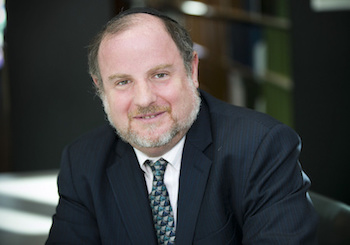Broyde lectures highlight contrast in Poland and Austria
By CSLR | Emory Law | Sep 8, 2017 12:09:00 AM

CSLR Fellow and Emory Professor of Law Michael Broyde lectured in Austria and Poland this summer, experiences that highlighted the differences between the two countries regarding divorce, diversity, and, the subject of his most recent book, arbitration.
Oxford University Press published Broyde’s Sharia Tribunals, Rabbinical Courts, and Christian Panels last spring.
In Vienna, he spoke about Sharia tribunals and New York’s regulation of religious marriage, a law unique to New York, at the Jewish Law Association European Regional Conference. He also spoke about the proper role of arbitration and why government should encourage arbitration of family laws.
“You are more likely to get a good resolution and can resolve family issues such as divorce, custody, and finances,” he said.
A cookie-cutter approach to family law worked in the 1950s when the vast majority of marriages looked the same, with the husband working while the mother raised children who were born in wedlock. But today there are many types of marriage, as well as monogamous couples who are not married yet have children and property to figure out when they break up. “The variety of family models is very great,” Broyde said. “We tend to have one law that reflects along the average, but the ability of the law to understand the dynamics of each family has diminished.”
Arbitration is more expensive and time-consuming, but it enables couples to design their own parting of ways specific to their relationship.
Vienna is cosmopolitan and diverse, with many types of marriage models, including traditional, same-sex, and, from the Muslim culture, a bit of polygamy, which is present, though not legally recognized. The city proved an ideal setting for the lecture. “They have arbitration, and they appreciate arbitration,” Broyde said.
In Bialystok, Broyde gave a lecture entitled, “Why liberal societies ought to encourage, but regulate, Christian, Jewish, and Islamic religious courts in the area of family law.” He observed a dramatically different society than Vienna. Poland is overwhelmingly Catholic. There is very little diversity. Divorce is rare, and there is no same-sex marriage.
Poland was diverse prior to World War II, with large Jewish and Roma populations, both of which allowed divorce. Mixed-marriages were common. But when the Jewish and Roma populations were wiped out, only Catholics remained. Poland was occupied until 1990. Since then, its location and insular culture have kept it from diversifying.
Broyde chafed at the culture’s the narrow view of marriage. “When you don’t have divorce, misery abounds,” he said. Couples remain tethered after their love has died and are denied the opportunity to build a new life alone or with a compatible partner.
He enjoyed learning about the country and spending time with scholars who share his interest in arbitration, which is thriving elsewhere in Europe.
Many European countries are also open to government regulation of religious marriage. “It’s in the air in Europe, and Holland already has it,” Broyde said, adding that marital captivity exists in Muslim, Jewish, and Catholic traditions. “The secular marriage can be dissolved by the government, but government cannot dissolve the religious marriage, and that’s a concern.”
In general, church and state issues are more relaxed in Europe, and countries are more apt to regulate. “The government’s regulation of religion is startlingly different than in the U.S.,” he said. “I learn so much every time I go to Europe.”

